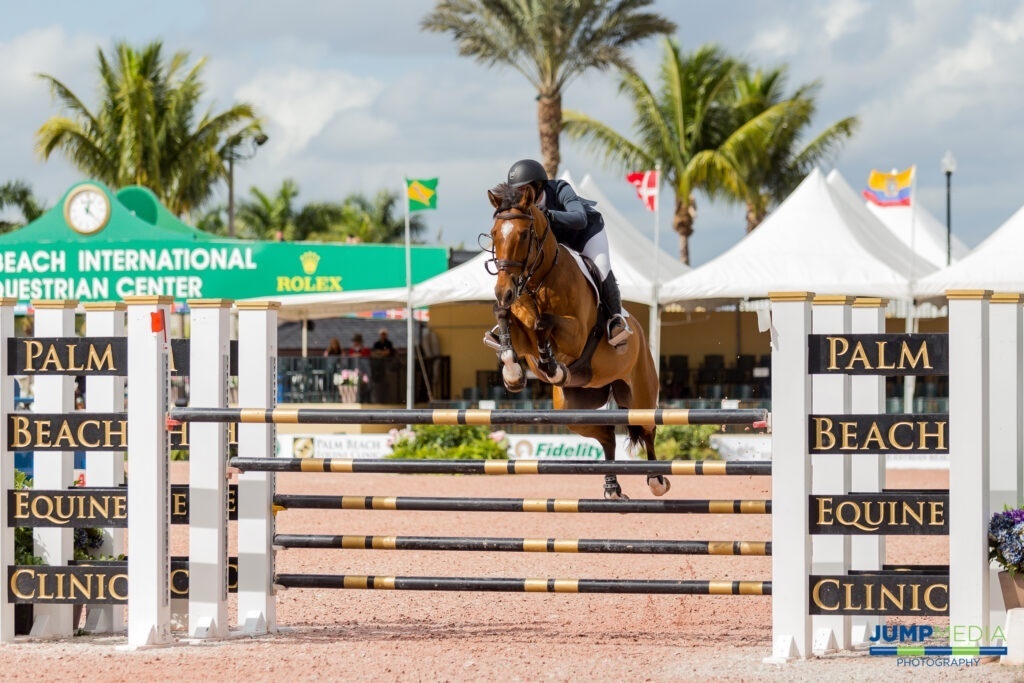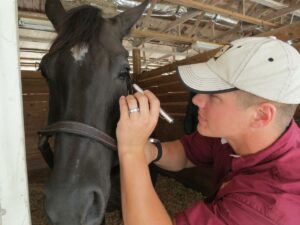Month: September 2014
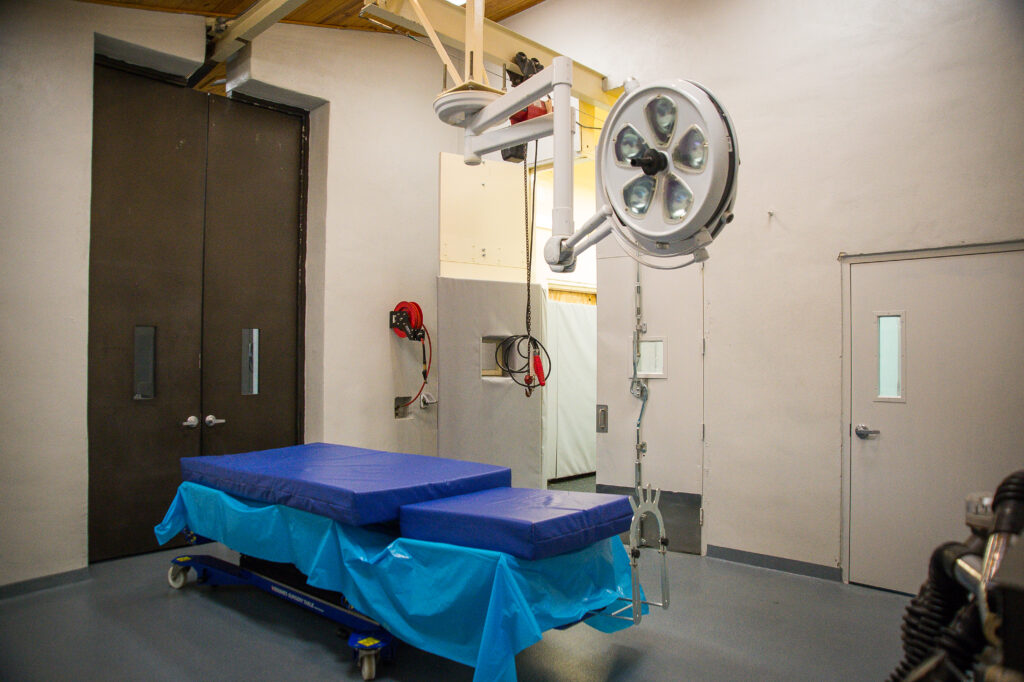
Best in Class Veterinary Team
Palm Beach Equine Clinic is renowned for its full-service surgical center and intensive care hospital located in the heart of Wellington, Florida. Board-certified surgeons, primary care veterinarians and hospital technicians are scheduled 24 hours a day, 365 days a year to treat, monitor and care for critical cases. With world-class veterinarians and a full staff of highly trained technicians, both clients and patients of Palm Beach Equine Clinic are in the best hands possible for equine emergency care and beyond.
Surgical Facilities for Equine Emergency Care and Beyond
Palm Beach Equine’s surgical suite and staff is prepared for all kinds of 24-hour equine emergency care. The large team of 24 veterinarians includes three board-certified surgeons who rotate on-call duties for all equine emergency care. This aids Palm Beach Equine Clinic veterinarians and all of Southeast Florida with the ability to quickly treat equine emergencies requiring surgical assistance. The state of the art intensive care hospital is equipped with digital video cameras for the clinicians to easily monitor their patients from any location, at any time.
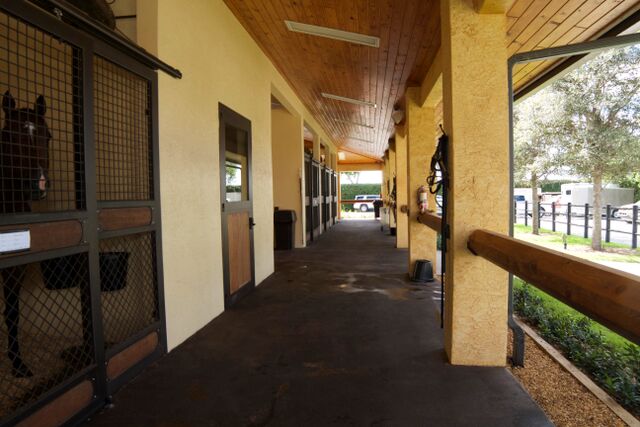
Laboratory and Diagnostic Capabilities
Palm Beach Equine Clinic has the most advanced imaging technologies available on-site, including Magnetic Resonance Imaging (MRI), Nuclear Scintigraphy (Bone Scan), Ultrasonography, Digital Radiography and Endoscopy. Palm Beach Equine Clinic has a board-certified radiologist on-site to interpret images and assist in precise diagnosis. Palm Beach Equin Clinic is equipped with a full-service laboratory with hematology, chemistry, and microbiology equipment to quickly help with the evaluation of each case.
For more information on Palm Beach Equine Clinic or in case of an equine emergency, please call (561) 793-1599 to contact an on-call veterinarian.
A leader in sport horse medicine, Palm Beach Equine Clinic is always on the forefront of advances in regenerative therapy. One treatment that has become widely used in modern equine medicine is the use of Platelet Rich Plasma (PRP) for soft tissue injuries.
Platelets are very small blood cells that are a crucial part of our body. Platelets are an integral part of the blood clotting process to stop hemorrhage from any wound. Platelets also contain Growth Factors – the elements that aid in healing and stimulate specified tissue to heal at an increased rate.
In order to treat your horse with Platelet Rich Plasma, the veterinarians at Palm Beach Equine Clinic are able to take a sample of the horse’s blood and concentrate the platelets in a high-speed centrifuge using procedures, filters, and equipment. The concentrated platelet rich sample is injected back into your horse at the specific area of injury in a sterile procedure usually ultrasound-guided.
A sample is pulled from the bloodstream in the exact method one would draw blood from the jugular vein. The pulled blood sample is then processed in the sterile laboratory on site at Palm Beach Equine Clinic to extract and concentrate the platelets in a condensed sample. The prepared PRP sample is injected into a tendon lesion or ligament or even into the joint space to provide natural growth factors to increase the tendon rate of healing and aid in the repair of the injury.
PRP treatment has had repeated great success in tendon and suspensory ligament injuries and is increasingly used in the treatment of intra-articular joint injuries. It can be very helpful to help repair cartilage and soft tissue injuries within the joint space.
Palm Beach Equine Clinic prides itself on continuing to remain State of the Art on continuing medical advancements. Along with PRP, Stem Cells are also frequently used with PRP. The growth Factors are combined with regenerative Progenitor Cells. This cutting edge therapy is part of a continually advancing field that has made exciting developments in both human and equine sports medicine.
Palm Beach Equine Clinic veterinarian Dr. Richard Wheeler considers PRP to be one of the best-studied regenerative therapies offered.
“The nice thing about PRP is that you are using the body’s own healing mechanisms,” Dr. Wheeler explained. “It is very natural; it is all endogenous. You are using the horse’s own cells to repair injuries, and it can be really useful.”
“Regenerative medicine is a very explosive field at the moment,” Dr. Wheeler continued. “We are improving and finding out new things all of the time. PRP is being used extensively in human medicine as well. It has good science behind it, so I think it will stand the test of time.”
Every regenerative therapy program is different and it is important to consult your veterinarian and understand the options and specific applications for each treatment. To find out if PRP therapy is right for your horse, contact Palm Beach Equine Clinic for more information at 561 793 1599.
Thoroughbred Brazilian Triple Crown winner Bal a Bali was admitted to Palm Beach Equine Clinic on August 3, 2014. The elite athlete was treated for life-threatening laminitis by board-certified surgeon Dr. Weston Davis of Palm Beach Equine Clinic, in conjunction with Dr. Vernon Dryden, just months after his Triple Crown win in March of that year.
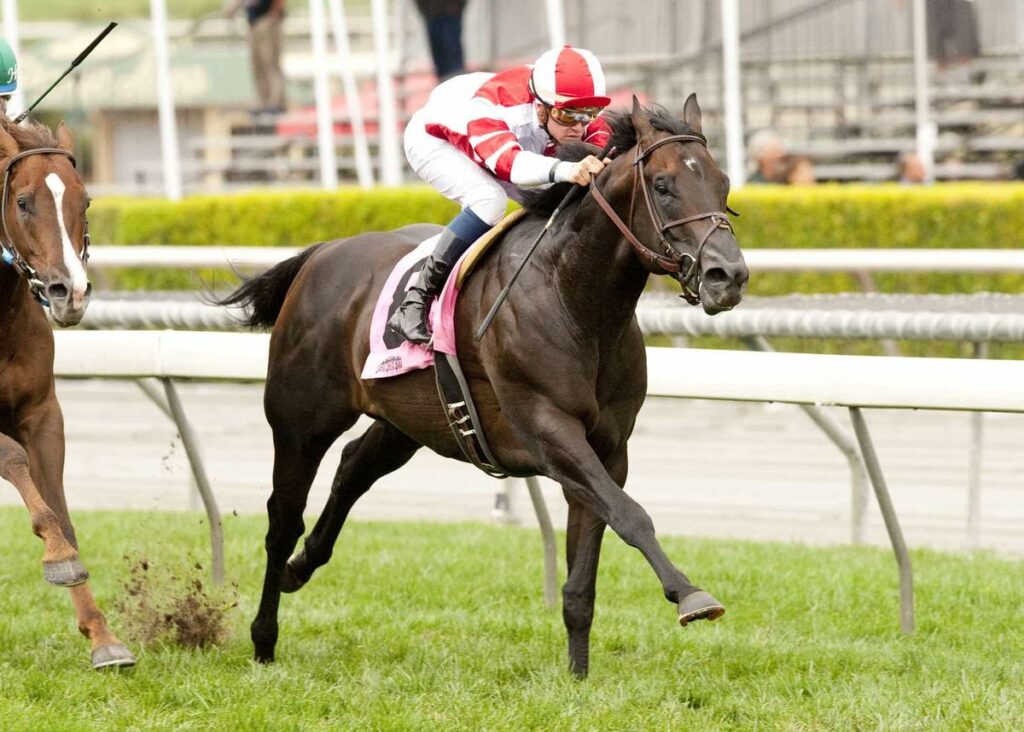
Brazil’s 2014 Horse of the Year, Bal a Bali (Put It Back—In My Side, by Clackson) took an impressive win in the Grande Premio Cruzeiro do Sul (Brz-I) to become the country’s 12th Triple Crown winner. He finished the race in track-record time at Gavea racecourse.
Following his last start in June 2014, Bal a Bali was purchased by Fox Hill Farm and Siena Farm and imported to the U.S. in late summer, but unfortunately suffered from laminitis brought on during his travels. Bal a Bali was in a Florida quarantine center scheduled to fly to trainer Richard Mandella’s stable in California when the problems developed.
Bal a Bali Admitted to PBEC Equine Hospital
Bal a Bali was quickly moved to Palm Beach Equine Clinic in Wellington, Florida, where he was received by Dr. Weston Davis, who would oversee his care in the equine hospital for the next three months. Palm Beach Equine Clinic set aside an entire section of the hospital barn as a quarantine unit to meet the horse’s final import requirements while he was treated with aggressive cryotherapy – a gold standard of laminitis care. Hospital staff carefully monitored Bal a Bali and treated him with consistent cold-water spa treatments for several days throughout the severe acute phase of this disease. He was gradually weaned out of the spa as he improved clinically.
On two occasions, Dr. Davis performed intravenous regional perfusions of the horse’s feet with advanced stem cell treatments. A myriad of other medical therapies were administered throughout his stay. The progression of his laminitis was closely monitored with the use of diagnostic imaging and meticulous farrier care. Farriery care included ensuring optimal sole support and proper mechanics to decrease strain on the fragile lamina. By October, the horse was cleared to travel to Siena Farm in Kentucky. There, Dr. Dryden continued to treat the horse and he was then flown to California in January.
Winning his Battle with Laminitis
After a nine-month recovery process, Bal a Bali made a miraculous return to the track for his North American debut in May 2015. He cruised to victory in the $100,000 American (G3), a one-mile turf race for three-year-olds and up at Santa Anita Park. At that point, the five-year-old had captured 12 of 13 career starts and earned $570,078.
Bal a Bali’s comeback was no doubt a result of the outstanding care he received at Palm Beach Equine Clinic under the extraordinary supervision of Dr. Weston Davis and Dr. Vernon Dryden.
Thank you Fox Hill Farm and Siena Farm for the trust you placed in Palm Beach Equine Clinic.
As you prepare to compete, the partnership with your veterinary team is critical for your sport horse’s health and success. It is comforting to know that the finest equine hospital and sport horse care in the Southeast is less than one mile away from the Palm Beach International Equestrian Center and across the street from the Global Dressage Festival. The veterinarians and staff of Palm Beach Equine Clinic are respected throughout the industry for their advanced level of care and steadfast commitment to the equine industry and horse care.
Palm Beach Equine Clinic is proudly the Official Veterinarian of the Winter Equestrian Festival and the Global Dressage Festival, two of the world’s most competitive equestrian horse show circuits.
The team is onsite at all the competitions to provide veterinary services and is ready to step up in case of an emergency. This dedication has become invaluable over the years to many competitors that have needed their expertise in veterinary medicine.
As the consistent leader in sport horse medicine, Palm Beach Equine Clinic provides 24-hour coverage at their all-inclusive on-site hospital; complete with full surgical and internal medicine capabilities, laboratory, pharmacy and advanced diagnostic imaging center.
State-of-the-art diagnostic imaging services include:
- Standing magnetic resonance imaging (MRI)
- Nuclear Scintigraphy (bone scan)
- Digital ultrasonography and radiography
- Standing computed tomography (CT)
Furthermore, Palm Beach Equine Clinic performs thorough lameness examinations, extensive pre-purchase/pre-lease evaluations, dentistry, podiatry consultation, and complete reproductive services. Palm Beach Equine Clinic also provides alternative medicine services such as chiropractic and acupuncture therapies, as well as, resourceful preventative medicine programs.
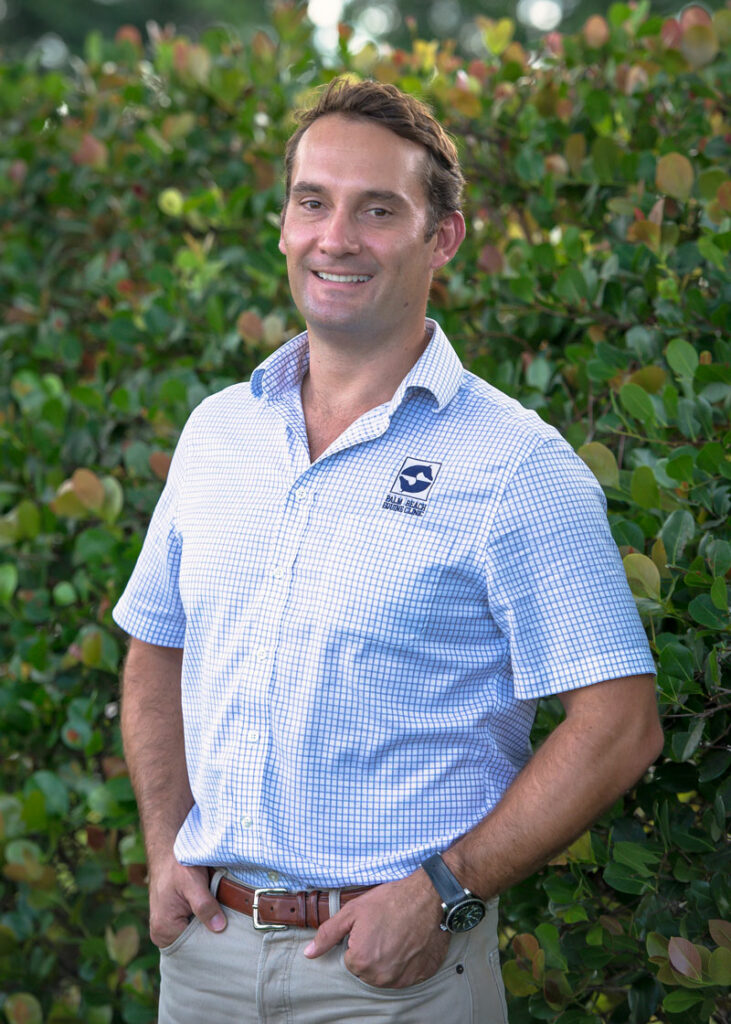
The veterinarians of Palm Beach Equine Clinic are are top-level academics frequently published in popular equine magazines and national veterinary journals. One of the more recent members to the Board of Directors at the Palm Beach Equine Clinic is Dr. Richard Wheeler, whose primary area of interest is equine lameness and sports medicine. He is passionate about his role in maintaining sport horses to enjoy a long and successful career.
What are the latest innovations that allow you to administer cutting-edge care to sport horses?
Dr. Richard Wheeler: There are many exciting new developments in equine sports medicine. The addition of imaging modalities such as magnetic resonance imaging (MRI) and computed tomography (CT) together with recent improvements in digital radiography, ultrasound and Nuclear Scintigraphy allow us to be more specific with our diagnoses and image areas of the horse that we were previously unable to image. Furthermore, regenerative therapies such as platelet rich plasma (PRP), bone marrow concentrate and the use of stem cells offer exciting opportunities with regard to the treatment of a wide variety of conditions, including soft tissue and joint injuries.
What do you find separates the most successful equine competitor from the rest?
Dr. Richard Wheeler: Across the field of disciplines, I believe attention to detail and a good team are the most important factors. As a veterinarian, I try to work closely with the owner, rider, trainer, farrier, groom and often many other support staff members. I will often examine the high level horses every week during the intense winter season and we will work together to make subtle adjustments to keep the horse performing at their very best.
How do you feel about your move to the USA and Palm Beach Equine Clinic ten years ago?

Dr. Richard Wheeler: Time has gone fast! There is nowhere in the world like Wellington, Florida, it is a wonderful place to live and practice veterinary medicine. Palm Beach Equine Clinic is an amazing family with a wealth of experience and knowledge to draw on. I think our greatest strength is our team approach; we will spend hours discussing and debating the best approach to cases and I think this is incredibly valuable to our clients. It is of great value to me as a veterinarian to have the high quality equipment we have invested in as well as the support of our Board Certified Surgeons (Drs. Brusie, Gomez and Davis) and our Board Certified Radiologist Dr. Puchalski. I am a strong believer in developing a specialty as a veterinarian so having the depth of support at Palm Beach Equine Clinic allows me to concentrate on lameness and sports medicine with the capability to provide my clients with doctors who specialize in other areas such as alternative therapies, reproduction and dentistry.
Dr. Wheeler’s extensive experience with a variety of equine performance sports advanced after graduating from the Royal Veterinary College in London in 2002. Dr. Wheeler completed an internship at the world-renowned Newmarket Equine Hospital, specializing in surgery and sports medicine, before moving to Palm Beach Equine Clinic in 2005. Licensed to practice in Florida, Kentucky and New York, as well as the United Kingdom and Europe, Dr. Wheeler is an FEI official veterinarian. A horseman himself, Dr. Wheeler has competed in a variety of equine sports including eventing, dressage, show jumping and polo.
Many international Grand Prix riders, such as one of the United States’ top Dressage riders, Tuny Page, attributes the health and soundness of her horses to Dr. Wheeler and the Palm Beach Equine Clinic team.

“Richard is a fine veterinarian with great depth of experience and super instincts. On top of that, he communicates beautifully with me as the client and my grooms as my horse’s managers. Richard is very secure in his positions about diagnosis and treatment of the horses, which allows him the ability to communicate openly with other veterinarians and therapists. This works particularly well when I am traveling with the horses and need to have open communication between other veterinarians and Richard. Richard has always treated my staff with the respect and integrity they deserve and the result is tremendous trust within our team. The most important recommendation for Dr. Wheeler is, quite simply, that my horses are happy, healthy and sound.”
International Grand Prix Dressage Rider Tuny Page
Additionally, International Dressage star, Mikala Munter (DEN), who recently won the FEI Grand Prix Freestyle CDI 4*, knows the importance of equine health and states praise for Dr. Wheeler.
“Dr. Wheeler from Palm Beach Equine Clinic has a good eye and feel for what a horse needs, and he is the best veterinarian for a sport horse”
International Grand Prix Dressage Rider Mikala Munter
Palm Beach Equine Clinic is committed to provide care for your equine athlete throughout the year and across the globe, and support at shows across the USA, Europe and South America.
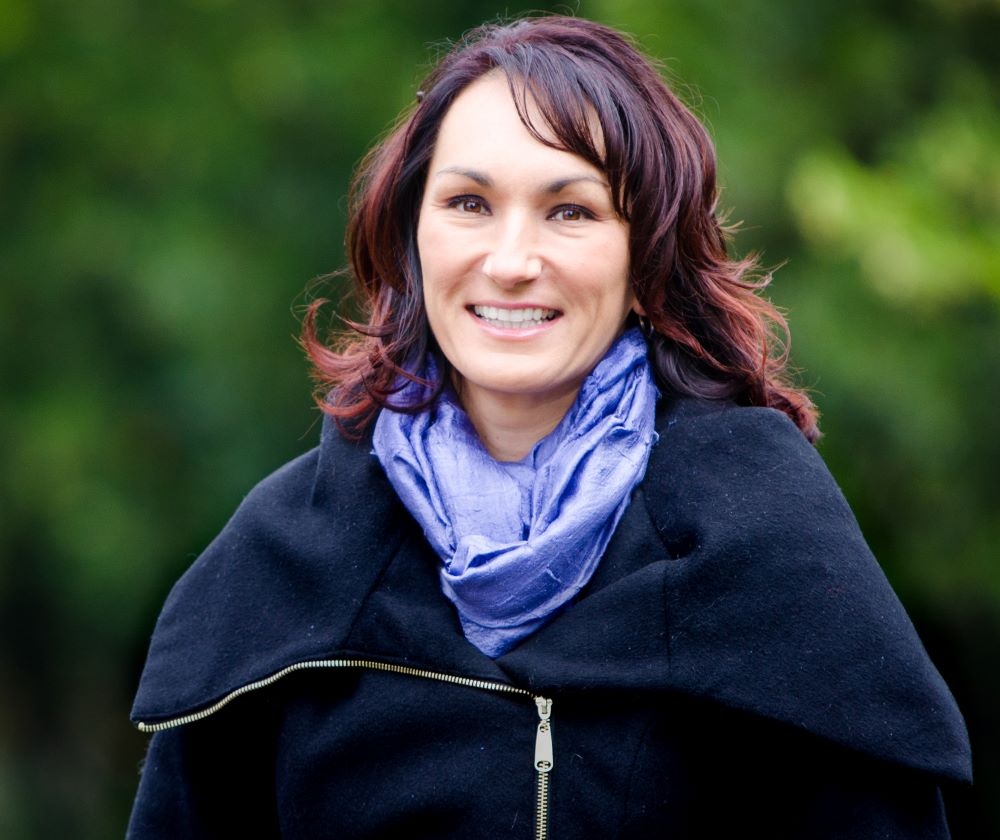
Dr. Sarah Puchalski is a Diplomate of the American College of Veterinary Radiology whose specialty includes the interpretation of bone scans, MRI, ultrasound, radiographs and other diagnostic imaging techniques. With her addition to the staff, Palm Beach Equine Clinic is one of the few equine hospitals in the country to employ a full-time radiologist on-site. In addition to working with horses locally and assisting veterinarians around the world, Dr. Puchalski also competes in the Medium and High Amateur Owner Jumper circuits.
It is important for clients to get know our doctors so we asked Dr. Puchalski to share a little about herself!
How do you like being in Wellington and having the opportunity to compete at the Winter Equestrian Festival?
I think it is a really unbelievable opportunity to ride in the most competitive rings in the country regardless of the level at which you are competing.
How do you like working at Palm Beach Equine Clinic?
Palm Beach Equine Clinic is great place to work. It is very vibrant and busy. I like the energy that comes out of the place and the imaging equipment is world-class.
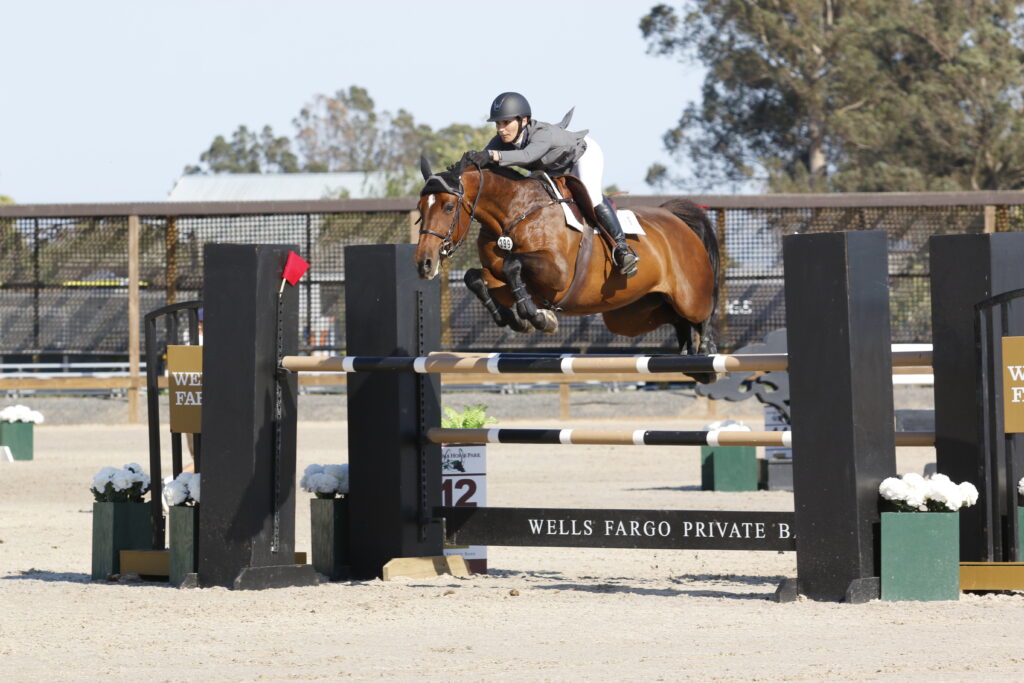
Why do you feel it is important to have a Board Certified Radiologist on site?
My full time job is image reviews which takes a high level of specialization. This provides support for all veterinarians ranging from field veterinarians to surgeons. It is very rare for an equine hospital to have a full-time radiologist so having one on board offers a step up in the quality of service. When a horse comes in for an MRI or bone scan everything can be reviewed before the horse leaves the clinic so if any other care is needed it can be handled in one visit.
What ways do veterinarians use radiologists?
There are a couple ways. One is that I read complicated images such as bone scans and MRIs. Most veterinarians do not have the training to read these images. The second way is to provide a second opinion on routine diagnostic techniques such as radiographs and ultrasounds. Clients and referral veterinarians will also use my opinion for pre-purchase examinations.
Tell us about your studies and how you’ve developed an international reputation?
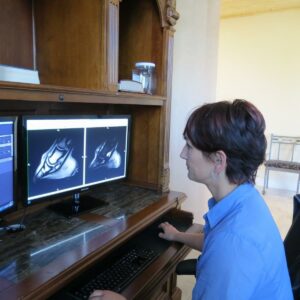
I did two internships in field service and sports medicine at New Bolton Center Hospital at the University Of Pennsylvania School Of Veterinarian Medicine. Then, I spent four years at the University of California, Davis in imaging. For eight years I stayed there as faculty for doing research instruction and clinical service. I have published more than 50 scientific articles and performed over 100 presentations around the world on lameness diagnosis and Diagnostic Imaging in Sport Horses.
What would you like veterinarians and owners to know about you?
My philosophy is to support all veterinarians, whether it be a veterinarian from Palm Beach Equine Clinic or a referral. I read cases from all over the world on a daily basis. Many owners ask their veterinarian to consult with me for a second opinion. I view my role more as a support role for all veterinarians to provide the best care for horses.
Major Developments at Palm Beach Equine Clinic

Palm Beach Equine Clinic is excited to announce the addition of the most advanced Equine Nuclear Scintigraphy Gamma Ray Camera. Last winter, Palm Beach Equine Clinic announced the grand opening of an eleven-stall barn for intensive and postoperative care. Four new offices were built for the additional seven veterinarians that joined the practice. This fall we will complete the renovation of the Nuclear Scintigraphy (bone scan) lab. In addition to installing the new top of the line Nuclear Scintigraphy camera manufactured by Medical Imaging Electronics.
Capabilities of Equine Nuclear Scintigraphy Imaging
The Equine Scanner H.R. designed by MIE reduces time required to scan the horse and provides more defined images. The new technology behind the Equine Scanner H.R. assists with the ability to produce high-quality images even if the horse moves slightly while taking an image. Image acquisitions will not have to be repeated as frequently which reduces the length of time required for a scan. The camera is equipped with special software that is designed to acquire images with sharp contours. This creates a precise, effective diagnosis of the lameness or specific point of injury. MIE describes their new gamma-ray camera as “an ingenious combination of mechanics, electronics and special software algorithms, which allows unique scanning on standing horses.”
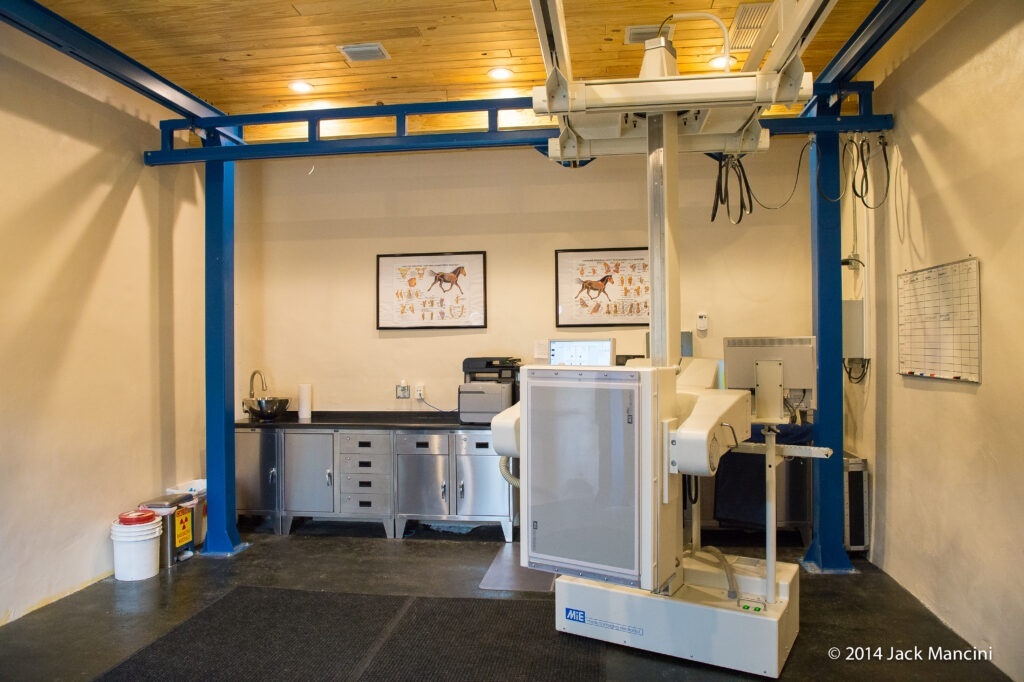
Palm Beach Equine Clinic is one of very few equine practices in the U.S. with a staff Board Certified Radiologist. World-renowned Radiologist, Dr. Sarah Puchalski, is on site to read and interpret images immediately so clients have results as quickly as possible. Dr. Puchalski is excited about the renovation and the new Equine Scanner H.R. machine.
“The addition of this scanner places Palm Beach Equine at the forefront of diagnostic imaging the world over. Excellent motion correction software and the largest field of view allows for accurate, rapid scanning of large parts such as the pelvis, back and neck in addition to the more routinely imaged limbs. It is very exciting to be able to work with these tools in Wellington,” said Dr. Puchalski.
Equine Nuclear Scintigraphy for Referral Veterinarians
Often times horses may have multi-limb lameness that makes it difficult for your veterinarian to pinpoint the problem. Dr. Puchalski gladly accepts referrals from other veterinarians and is happy to assist in the specific diagnosis of your horse’s ailments. Palm Beach Equine Clinic has performed over 3,000 bone scans in the last decade.
We remain the leader in Equine Imaging. Please contact Palm Beach Equine Clinic by calling (561) 793 – 1599 to schedule your horse’s imaging appointment.
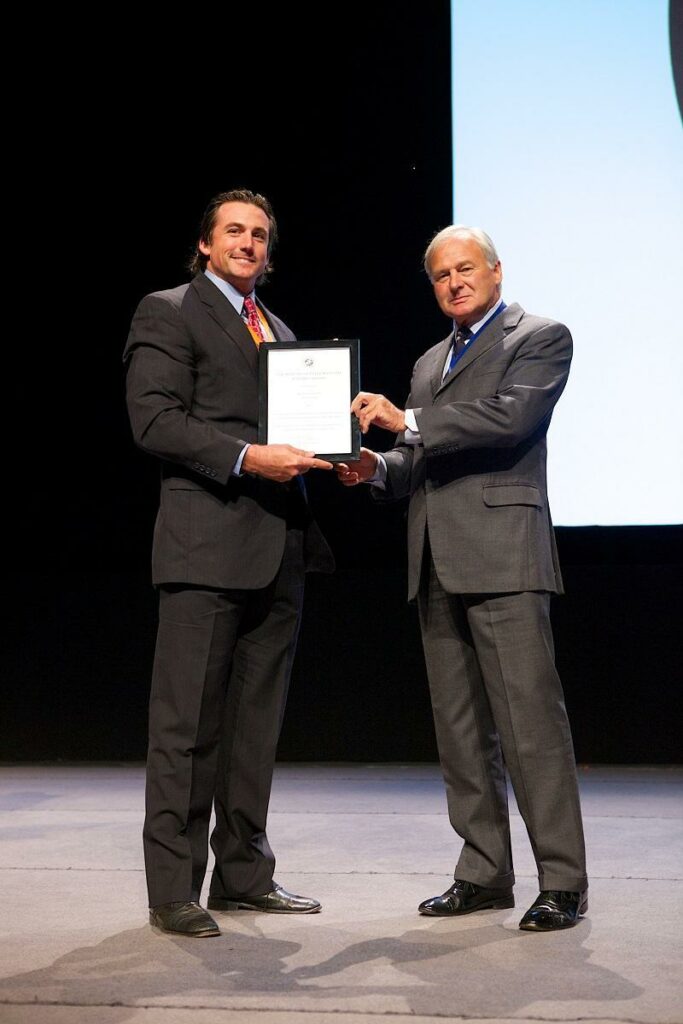
Congratulations to Dr. Weston Davis for winning the BEVA Trust Peter Rossdale EVJ Open Award at the 2014 BEVA Congress in Birmingham. The award was for a paper Dr. Davis wrote entitled:
Introducing Dr. Ryan Lukens
Dr. Ryan Lukens joined the Palm Beach Equine Clinic team in June of 2012. He has been a great asset and some of you may not have had the opportunity to meet him.
Palm Beach Equine Clinic currently has 24 veterinarians providing exceptional veterinary care and client services. As we grow, thanks to our clients, we feel it is important that everyone gets to know our veterinarians. Not only professionally, but also personally. Each of our doctors brings exceptional veterinary skills and great personal strengths to our Palm Beach Equine Clinic Family. It is the combination of these strengths that makes our Team a success.
We sat down to interview Dr. Lukens and asked him to tell his story.
Q: You went to Ohio State and played football, do you feel that your football career helped you with your future in veterinary medicine?
A: Yes, I played football for 5 years at Ohio State, from 2004 to 2008. I was a fullback and a linebacker. My senior season was my freshman year in veterinary school. I remember studying for Cell Biology and Clinical Pathology during my plane rides back from games.
My coaches were very accommodating. I would usually have to skip Sunday film day to study for Monday exams and then make up film review after my exams on Monday, which would usually have been a “day off” from football. Needless to say I was busy during that first quarter of vet school. Football taught me discipline and time management.
My Coach, Jim Tressel, instilled values in his players by group discussion and study of leadership books. These values affect my career today, I am always aware of how my actions and words affect everyone around me. The lessons from Coach Tressel have helped me improve my communication skills with my clients and fellow colleagues.
Q: Your wife is a small animal veterinarian, how did this play a part in your education and career?
A: My grades were above average during my last football season but improved the following quarter. This improvement in grades can be traced back to meeting my future wife in school a month after my football career ended. The day we met we spent most of our time studying together and immersing ourselves in our class work.
Studying became fun and we tackled the challenges together. She was small animal oriented and I was able to teach her equine aspects while she helped me with small animal based courses. From our separate experiences working with different animals our entire pre-vet school lives, we greatly improved each other’s understanding of former less-familiar species.
When we entered clinical rotations our 3rd year, I would always find a way to get out to the barn rather than stay in the small animal clinic. It was fun being able to teach my wife about horses, she had almost no experience with horses when we met.
Q: How do you feel about being a part of the Palm Beach Equine Clinic team of doctors? What kind of experiences have you had since joining PBEC?
A: I am more than happy to be a part of this prestigious clinic and to live in the center of horse country in South Florida. I do not miss lameness exams in the snow! I started working at Palm Beach Equine Clinic for over 6 weeks while I was finishing school. This opportunity led to a great start in my career. I was able to familiarize myself with the operation of this efficient, tertiary medical facility.
My interests in school and to this day are sports medicine and I always envisioned performing competent lameness exams. Over the past year and a half, my lameness exam numbers have increased exponentially. This past winter season I was successful in keeping several horses that had lameness issues early on sound throughout the entire season. I enjoy doing pre-purchase examinations. I am fortunate that this area offers a great amount of sale horses. Pre-purchase exams are also an excellent way to develop relationships with new riders and trainers.
Moving from Ohio, I was quickly introduced to “summer sores”. Habronemiasis (summer sores) are not seen clinically in the north. So becoming more educated on them and providing successful treatment has been an educational experience for me.
A fortunate part about being a team member is the number of doctors and specialized fields that Palm Beach Equine Clinic offers. This is what makes the veterinary care here so proficient. It benefits the patient and client as we are able to share ideas and consolidate treatment options amongst our large team.
Q: What are your goals for the future?
A: I am currently working on becoming ISELP (International Society of Equine Locomotor Pathology) certified. This course and certification will continue to expand my knowledge and treatments of lameness. I look forward to meeting new clients and treating new horses. In the future, I want to join the ranks of the lameness experts known throughout the country. Wellington is one the greatest places in the world for the opportunity to treat the best horses in the world. I wouldn’t want to be anywhere else.
Battling Equine Summer Sores
Summertime is here and along with the summer months in Florida comes humidity and an increase in the fly population. Unfortunately for horse owners, an increase in the fly population creates many problems. One major problem that seems intensify every year is equine summer sores, or medically known as Habronemiasis. Equine summers sores are lesions on the skin caused by worm larvae from the horse’s stomach.
Easy Culprit: Flies
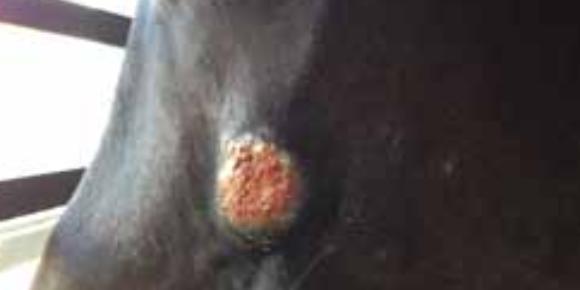
How does the stomach worm larvae end up as a skin lesion? One simple answer is from a fly. The stable fly is a host for these parasites. The worms in the horse’s stomach produce eggs that pass through the digestive tract, which end up in the horse’s manure. After that, the eggs then hatch to develop larvae that attach to the blades of grass.
Chain Reaction
The fly carries the larvae on its extremities and is attracted to mucous membranes or open wounds on the horse. Next, the larvae infect the open wound or a mucous membrane such as the eye or prepuce. This creates a type of allergic reaction within the immune system causing inflammation, discharge, and the production of granulation tissue infected with larvae. One way to tell if you are dealing with a summer sore is the granulation tissue contains small yellow rice like larvae within the skin and a mucopurulent discharge associated with the wound.
Summer Sore Prevention
The best way to avoid equine summer sores is to prevent them. Fly control, proper wound care, and most importantly an effective de-worming program. Habronema species are the source of summer sores. Please call Palm Beach Equine Clinic and discuss with one of our veterinarians a proper de-worming program.
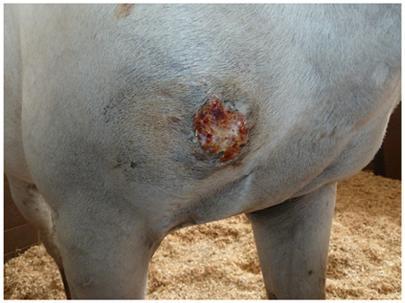
Proper treatment of the lesion is extremely important. Delaying initial treatment may result in an increased cost. Delaying treatment may require surgical excision of the granulation tissue and possible skin grafting. Severe Habronemiasis of the male horse’s sheath may require reconstructive surgery of the prepuce and/or urethra.
Contact Palm Beach Equine Clinic to Treat Equine Summer Sores
At the first sign of an equine summer sore, contact your veterinarian at Palm Beach Equine Clinic at 561-793-1599.
Palm Beach Equine Clinic was proud to be one of the sponsors for the 2014 Pony Derby held at the PBIEC Stadium. In addition to the sponsorship, they donated a day with surgeon Dr. Bob Brusie which raised a record amount of $10,000! Thanks, Dr. Brusie for your support!!

Dr. Brusie graduated from Michigan State University College of Veterinary Medicine. He completed his surgical residency at the Marion DuPont Scott Equine Center in 1989 and has been in private practice ever since. He became Diplomate of the American College of Veterinary Surgeons in 1994. Dr. Brusie joined Palm Beach Equine Clinic in 1996 as Head of Surgery.
Dr. Bob Brusie is a board-certified surgeon who is recognized for his expertise in colic surgery, as well as for his skill in arthroscopic surgery. His surgical experience expands the clinic’s progressive care in both emergency and elective procedures. He has published articles on numerous topics, including the equine intestinal tract and septic arthritis in horses. Dr. Brusie is married and has three daughters.
